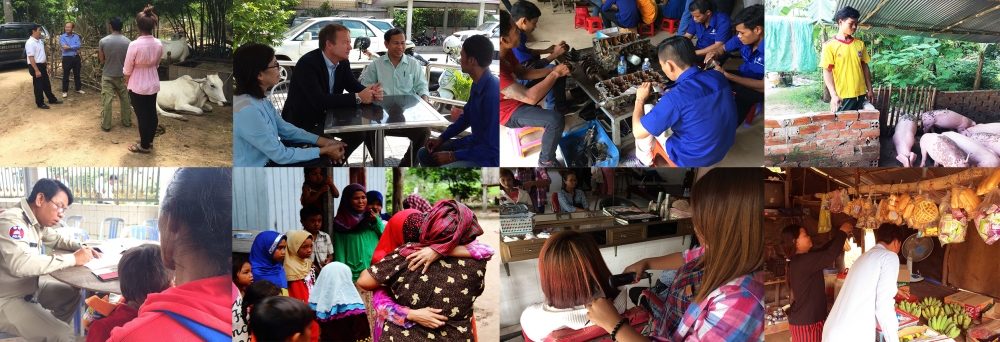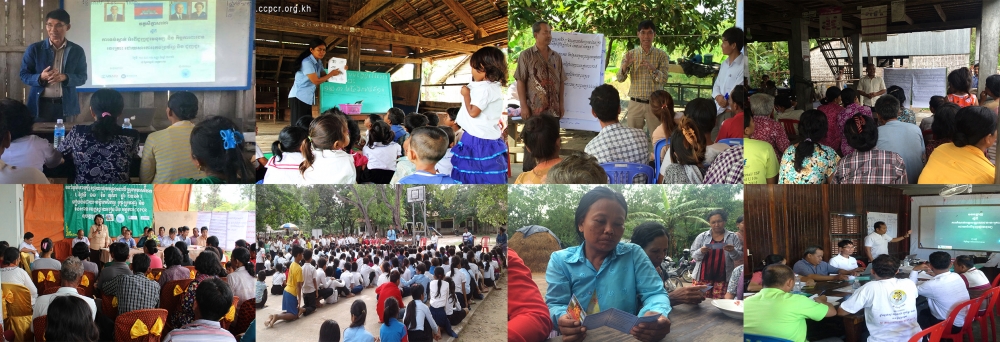Phase 2: Rehabilitation

Many girls have been through traumatic experiences and CCPCR feels it is very important that we provide counseling to our beneficiaries to reduce feelings of shame, isolation and fear; and to improve self-sufficiency and self-esteem.
All girls receive medical (including HIV testing) and dental check-ups on arrival at the shelter, as well as medical care if they become sick. In addition CCPCR is instigating an education program to cover basic medical knowledge, especially in the area of reproductive health, as well as providing life-skills training in the areas of nutrition and personal hygiene.
All girls attend primary education at local state schools. CCPCR also provides non-formal education and life-skills lessons at the shelters in addition to vocational skills training to all of the girls.
Due to the nature of their abuse or exploitation, a number of girls require legal assistance. CCPCR partners with the organizations LICADHO and Adhoc that assist with any legal needs. However, there is no strong system in place to encourage beneficiaries to pursue legal cases against abusers. There is a need for staff trained in extracting sensitive information from victims. A high percentage of trafficking cases go unreported, those that do get reported are often not investigated, or if investigated often left not prosecuted due to a lack of legal representation and evidence gathered.
The provisions in the shelters are basic, but offer a place for the children to be children, to grow, laugh and learn together in a safe and loving environment.
CCPCR reviews the programs regularly in order to provide successful and sustainable rehabilitation and reintegration for each girl.
Children are provided with:
- A safe and secure environment and basic needs such as: food, clothes, accommodation and health checkups.
- Basic education, including all necessary school materials.
- Psychological and medical treatment including counseling
- Community based rehabilitation
- Vocational skills, including sewing, cooking, weaving, hairdressing, motor and electronics repair, handicrafts, housekeeping and agricultural training. Training either takes place at the shelter (for example sewing and weaving in Phnom Penh), or children are referred to private shops for more specialized training and apprenticeship programs.*
- Extra lessons in English, Math and Computer skills.*
- Sports activities and health care workshops.*
- Social activities, including excursions.*
- The shelters also benefit from the help of international volunteers who provide English tuition, art classes and extra-curricular activities to the children outside of their normal school hours.
Last year CCPCR received 211 new cases (including one boy) through its NGO network and various stakeholders such as the Social Affairs department, CBPN members, LICADHO, VSNP, Anti-Trafficking Police, RAO and local authorities.
Ø 95 child victims accepted to stay at Svay Rieng shelter.
Ø 116 child victims accepted to stay at Phnom Penh shelter
|
No. of cases |
SERVICES RECEIVED |
|
| 144 cases |
Counselling and individually tailored therapy |
|
|
142 cases |
Full reintegration including referrals to communities, NGOs, partners or the private sector to receive vocational training skills. |
|
|
143 cases |
Computer, English, Arts and Crafts training in CCPCR shelters |
|
| 45 cases |
Vocational training courses and reintegration back to their families and/or communities. |
|
| 49 cases |
Education at public schools (from grade 1 to grade 12) |
|
|
189 cases |
Workshop training and education on family planning, reproductive health, morality, safe migration, drug addiction, swine flu, H1N1, gender equality, laws of human trafficking, children’s rights, advocacy, cooking, basic agriculture (cattle farming), vegetable growing and horticulture. |
|
| 65 cases |
Attended non-formal education in CCPCR shelter and communities. |
|
|
220 cases |
Provided general physical medical check-ups through private firms |
|
| 78 cases |
Received dental check-ups and treatment from private dentists. |
|
| 40 cases |
Received HIV/AIDs, STD, general health and organ tests |
|
Activities
- Child Pursues Education, After CTIP Supports on Business to Family
- Vulnerable People sharing Experienced on Benefit of Raising Chicken
- Helping Vulnerable Families Improve their Lives
- Trafficking Survivor Sharing Experience of migration
- My Dream Came True as a Barber
- Former Trafficked Victim Got supported to Improve Livelihood
- Livelihood Supported to Pursue Hope
- “My Dream Come True with Hair Dressing and Salon Business”
- Rice Bank Met the Need of People to Stop Risky Migration
- Pig Raising to Improve livelihood of Survivors
- "Cows Bank", is the Resource of Sustainable Livelihood
- We Together to End Human Trafficking
- From Miserable Life to Get a Skill of Hairdressing
- SVG Trained Beneficiary to Be Sustainable Farmer
- Local Leaders Share Lessons Learned and Plan for Sustainable Anti-Trafficking Efforts
- Successful Collaboration to Return 33 victims from Vietnam
- Survivors of Labor Trafficking Receive Support to Pursue Safe and Sustainable Income Sources
- CCPCR Conducts a Chicken and Pig Raising Training for Capacity Building
- 23 Labor Trafficking Victims Were Back to Community Successfully
- Chinese Guests Visited CCPCR to Hear Experience of working with Human Trafficking Victims
- AOI's Students Visited Child Prevention Project
- Collaborative Effort Leads to Successful Repatriation of 54 Cambodian Men Trafficked to Fishing Boats
- Risky Migration Lead to Trafficking Issues
- Livelihood Training Workshop on Chicken and Pig raising to Victims and Victims'family
- 15 Survivors Returned back to Community With New Life
- 4 victims of human trafficking from Vietnam, Returned Back Successfully
- Eleven Trafficked Children to Beg in Vietnam, Returned to Cambodia
- CTIP Secures the Second Chance at Education for 22 Trafficked Children Forced to Beg in Vietnam
- National Verification Process in Thailand
- Press on After Trafficking Launch
- Angkor Wat Bike4Kids! Event
- Radio Australia Broadcast
- Featured in Global South Development Magazine
- A major fundraising campaign for CCPCR!
- CCPCR's Christmas party!
- Painting in Phnom Penh!
- Sihanoukville Shelter - Can you help?
- Lotus House - Siem Reap
Download Document
- Local Leaders Share Lessons Learned and Plan for Sustainable Anti-Trafficking Efforts
- Successful Collaboration to Return 33 victims from Vietnam
- 2015 Annual Report
- Snapshot-Forum Empowers Human Trafficking Survivors to Make Recommendations to Policymakers and NGOs
- Snapshot-Survivors of Labor Trafficking Receive Support to Pursue Safe and Sustainable Income Source
- CCPCR’s Prevention Activities for October
- CCPCR CSO Certificate certified and approved by Minister of Ministry of Social Affair
- Case study - IOM training on representatives of 14 child clubs
- 2014 Annual Report
- Case study - Child Club in Thmei commune
- Case Study - Teng Mao Community
- Case Study - Training on pig farming in Thnout commune
- Case Study - Community Learning Centre in Chres commune
- Case Study - Parental Group in Tuol Ampal village
- Case Study - Child Club in Kandal Village in Thnout
- More than just victims- the truth about human-trafficking
- What are you grateful for?
- Shelter Appeal
- CCPCR's Rehabilitation strategy
- Organizational Chart
- CCPCR's Child Protection Policy
- Human-trafficking in Cambodia
- Human Trafficking FAQ's
- Statement for human rights day, December 10, 2014.
- Current situation on process to migrate to Thailand in EN
- Current situation on process to migrate to Thailand in Kh
- 2013 Annual Report
- 2012 Annual Report
- Svay Rieng Shelter
- 2011 Annual Report
- 2010 Annual Report
- Svay Rieng Presentation 2010
- CCPCR's Rehabilitation strategy



